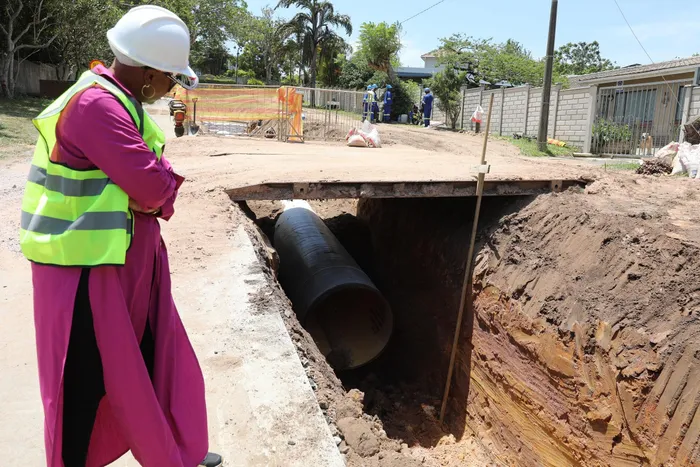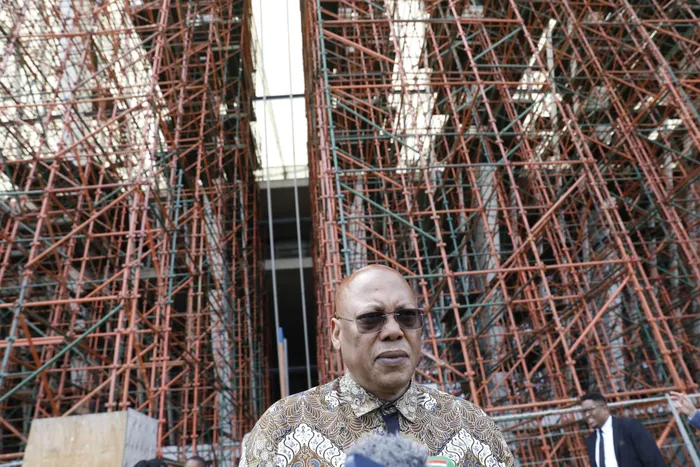Persistent water and sanitation challenges drive businesses away from eThekwini

Members of the Presidential eThekwini Working Group conducted an inspection at infrastructure projects in Durban on Thursday.
Image: Doctor Ngcobo / Independent Newspapers
Businesses have left eThekwini Municipality in favour of the northern parts of the province amid persistent water and sanitation challenges. Despite 18 months of intervention at the highest level, water and sanitation in the eThekwini Municipality continue to be a serious problem.
The business community has expressed frustration over the situation, leading some medium-sized businesses to relocate to other areas of the province, with the biggest beneficiaries being regions like the Ilembe District. Businesses voiced their concerns yesterday as the Presidential eThekwini Working Group toured the municipality's projects to assess the progress made to date.
The group was established by President Cyril Ramaphosa nearly two years ago following complaints from the business community about the state of the municipality amid several crises, including water and sanitation issues. The group has several streams focused on tackling different challenges, including service delivery, addressing inefficiencies in municipal operations, and tackling tourism-related issues.
During their visit, they inspected several ongoing projects aimed at boosting tourism and addressing water challenges. These include the work being done on the RiverTown precinct and the construction of water infrastructure in the southern part of the city.
It was revealed that the RiverTown precinct has been revitalised, with plans to transform it into a social hub featuring restaurants, art galleries, and art markets. At the Southern Aqueduct, over a billion rand will be invested in new water infrastructure to alleviate water pressures, with commissioning expected by August next year.
KE Macllwaine, the first Vice-President of the Durban Chamber of Commerce and Industry, stated, “We are all passionate about getting the city right and returning it to where it was. What is encouraging is the commonality in the language between the national government, the city, and ourselves in terms of what we are trying to do. There has been a lot of progress that has not been communicated widely enough.”

Presidential eThekwini Working Group co-chair Mike Mabuyakhulu speaks to the media.
Image: Doctor Ngcobo / Independent Newspapers
“There has also been a commitment from the presidency to address the issues that remain. Those issues are not easy; they are complex. We are very sympathetic and collaborative,” he added. “The biggest issue that is outstanding is water and sanitation. The underlying issue is that there have been many years of insufficient maintenance and ageing pipes.
“I know the city is prioritising that, but to date, there has not been much of an impact,” he said, noting that excessive water usage is also a contributing factor, with residents using more than 265 litres of water each day instead of the recommended 220 litres.
“Non-revenue water is still way higher as a percentage, and that has to become a priority. Unfortunately, it results in water outages for residents and businesses that significantly impact people. I would rather live without electricity than live without water; that is far more impactful, and we would ask the city to strengthen its efforts to improve that performance,” he said.
Asked about the impact on business, Durban Chamber CEO, Palesa Phili, mentioned that a few medium-sized businesses have left, relocating to the southern part of the province.
“The main issue is that water, sanitation, and the distribution of electricity play a very key role because we cannot afford to have cuts in these services, especially in industrial areas, where disruptions can be costly and create numerous issues,” she said.
“There are medium-sized businesses that have left for the northern part of the province, like Ilembe or the southern part,” she said.
Macllwaine added that they hope to attract those businesses back and bring in new ones, emphasising the importance of building business confidence in the city.
Sipho Cele, the Executive Director in the office of the City Manager, stated that the city is on track to address the challenges it faces, particularly regarding water issues.
“This working group is effective; they are coming to assist us in improving our system. In the two years we have had a presidential group, we can see progress in the way our systems are responding.” He acknowledged that not all difficulties will be resolved in two years.
“We are slow at delivering in a manner we should be delivering to our communities.”
He mentioned that the infrastructure the city is building has produced results and reduced water outages in many areas. Another project will soon come online to alleviate water challenges in the south.
Presidential eThekwini Working Group co-chair, Mike Mabuyakhulu, said the group is fulfilling its mandate with several workstreams dedicated to addressing different challenges.
He noted that the issue of inner city decay is not unique to eThekwini; many cities around the country face similar challenges as they expand outward, leading to decay in the oldest central parts of the city.